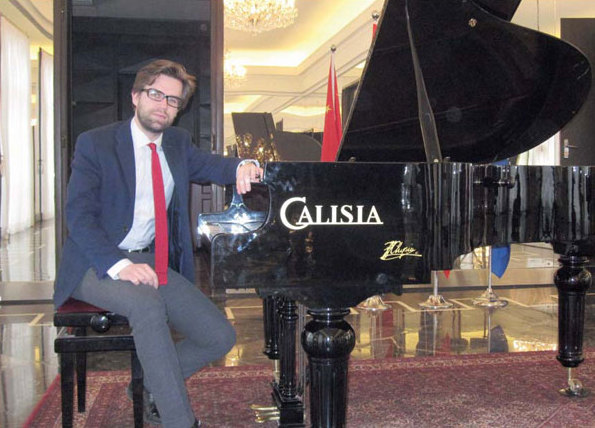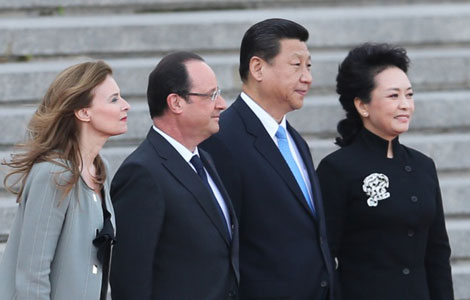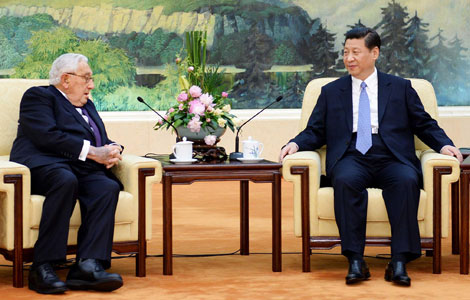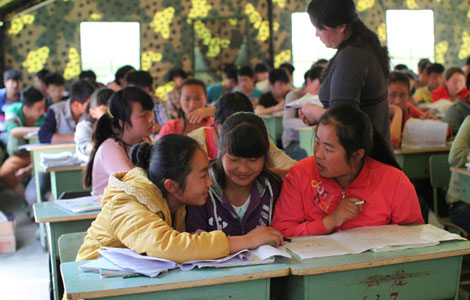Polished performance
Updated: 2013-04-26 07:23
By Ji Xiang (China Daily)
|
||||||||
|
Marek Bracha says he hopes to deliver a kind of Western style combined with some Slavic qualities and spirit to the Chinese audience. Jixiang / China Daily |
Classical Polish pianist Marek Bracha has found a warm reception in China for his performances with a Slavic slant
Polish pianist Marek Bracha has been a frequent performer in China in recent years, playing the classics of Chopin and also lesser-known Polish composers.
During his most recent shows, the youthful Pole played Witold Lutoslawski, marking the 100th anniversary of the Polish composer's birth. In Poland, 2013 has been named as Lutoslawski Year in his honor.
"For me it is crucial to include some of his work for piano solo in my program," says Bracha.
Bracha's pride in his Polish roots is matched by a fascination with China that stretches back to 2008 when he was invited to perform at a number of special events surrounding the Beijing Olympics, including performing for athletes at the Polish embassy. For him, being able to play the best of Polish composers overseas is a way of spreading their greatness.
"Sometimes you just treat your job as a kind of missionary type of work. Apart from pleasing people and moving them, which is the main aim of them coming to a concert, also promoting music and letting people know and learn about some new kinds of music is very important," he says.
His 2010 trip was the most memorable of his four visits to China, he says, when he performed at the closing ceremony of the Chopin Year performances at the National Center for the Performing Arts, which he says holds prestige equal to any grand music hall in the world.
Performing in China has been both exciting and challenging for Bracha. "For a pianist, it is always really important and somehow difficult to come to China to perform, because here you have dozens of millions of pianists being educated and then performing," he says. "Compared to the whole population of Poland, which is nearly 40 million, this is a huge number and Chinese audiences are used to Chinese performers."
He hopes to dig deeper into China with each visit. "At the beginning, I thought it was impossible to please these audiences, but I think somehow to deliver a kind of Western style combined with some Slavic qualities and spirit gives new perspective or a new quality to the performance. With a sense of modesty may I say the Chinese audiences, they like my performances. Personally I feel really obliged to deliver music at the highest quality that I can."
Bracha also appreciates being able to play for other professional musicians in China. "I often get the chance to meet either great professors or pianists," he says. "You know they are really important people to play for. It is not just a general audience. You always want to please, but also at this kind of academic and artistic level you really need to deliver."
The warmth and welcome he has received from Chinese audiences has inspired him. "They are really friendly and they have no hesitation in coming to you after a performance asking for an autograph or having a picture taken with you, which is really great. I really love that. Receiving good feelings from people and then just having the feeling that they like the performance and they like you," he says.
Born in Warsaw in 1986, Bracha was encouraged to begin playing piano by his parents at the age of seven. He says starting at such an age is late compared to many of his Chinese or Japanese counterparts.
"At some point you have to make the decision whether you want to devote your whole life to music and make it your regular occupation, so it happened, and I am really glad that I can still do it and make it a great joy for myself, and also give a lot of pleasure to some of the audience," he says.
Since then, his life has been filled with practice and performances, many of them overseas. One solo recital that sticks in his memory was in Denver, Colorado.
"I instantly felt it was a unique time for me," he says. "I performed a lot of Chopin's pieces and the audience was very excited about this. Personally, having such warm and cheerful listeners in front of you makes your playing even more special for you.
"What I learned from my visit to America, from the performer's point of view, is how strongly my enthusiasm about music can interact with the audience and then return to me with even stronger impact. I think this was one of the most remarkable events in the early years of my musical life."
One thought remains constant during Bracha's travels and that is the ability of music to transcend boundaries.
"Music itself is an international language and you can play all round the world and somehow move people's hearts in a similar way," he says. "It is less connected to the geographical point, but rather the type of concert, the venue, or general atmosphere the concert brings; so if this is an open air concert, or this is a private concert, or it is for a huge hall, these are the facts that vary the actual repertoire for the concert."
Those moments on stage are the tip of an iceberg that the audience does not see, he adds.
"After a long long time practising you come once on stage and have five minutes to deliver it to the public, so what you are delivering is actually what you have worked on before. There is never a complete moment of fulfillment," he says.
Putting real feeling into music is essential to perform to one's best ability, he believes.
"The difficulty is always the same, I guess, to be fair with yourself," he says. "To be yourself is just the basic thing. Without being honest to yourself the audience feels this instantly. First you need to feel what you are doing, coming from the bottom of your soul, when you go on stage, you know this is what represents you, your style, your skills."
Bracha views his travels and experiences overseas as part of a learning experience that helps to improve his performance.
"I think the right approach to any artist's life is that you dedicate your whole life and you never stop asking yourself whether this is good enough.You always want to develop yourself to be better."
"Your style and demands grow and grow throughout your life and once you have the feeling that you have achieved something, this is the time to stop doing it, because it is no longer an art. I think, for everyone, this is about your style evolving. You grow through experience and become more mature."
jixiang@chinadaily.com.cn
(China Daily 04/26/2013 page21)
Most Viewed
Editor's Picks
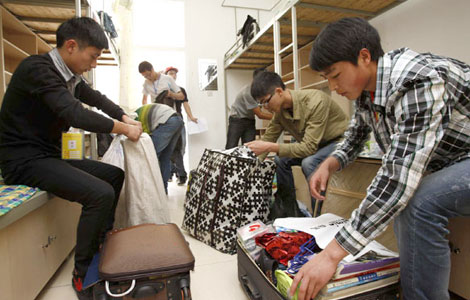
|

|

|

|

|

|
Today's Top News
No let up in home price rises
Bird-watchers undaunted by H7N9 virus
Onset of flood season adds to quake zone risks
Vice-president Li meets US diplomat
China has a tourism law
Meeting delivers big deals
China denies border spat with India
Chinese consumers push US exports higher
US Weekly

|

|
